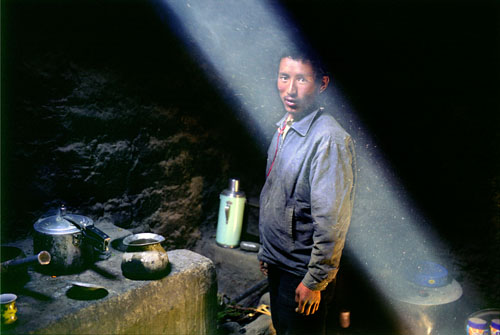Viviane DALLES
This post is also available in:
 Anglais
Anglais
© V i v i a n e D a l l e s 2 0 0 9
Mustang is situated in the north of Nepal at an average altitude of 10,500 feet. It is home to about 6000 people of which the majority are from the Bista community – Nepalese of Tibetan origin. Here, tarmac and vehicles don’t exist, the only way traverse this isolated region is by foot or by horse. History tells us that the Forbidden Kingdom became independent after 1380, when a warrior and devout Tibetan Buddhist Ame Pal built the fortress at Ketcher Dzong. After his defeat at the hands of local warriors, Ame Pal founded a fortified capital, Lo-Manthang. The current king, Jigime Palbar Bista, has no political power, but remains loved and respected by the population. At the beginning of Nepal’s parliamentary democracy in 1990, Mustang was opened to foreigners but with limited access by way of a paying pass. Here, nature is king. It dictates the daily rhythm of the inhabitants. Journeys are counted not by distance, but in hours. A schoolchild might take two hours to get to his class. An old lady, 3 hours to travel to the doctor or a farmer 8 hours to retrieve his herd yak from the valley. Electricity is rare in people’s homes. Candles prolong the day by a few hours, but most activities quickly grind to a halt after sunset. Having herded the flocks into their paddocks, families sit in circles around the stove. The porters bring news from neighbouring villages and the swaddled children cling onto their mothers. Only the wind moves in the alleys stirring up clouds of dust. The fertile fields around the villages where the villagers grow cereals, vegetables, potatoes and fruit, provide a rich and varied diet. For the other necessities of daily life, they travel twice a year to Tibet or into the Kathmandu valley. It’s an expedition from which they return in a convoy of horses with provisions for the coming months. Over the centuries, protected by their mountainous frontier, Mustang remains a place of mystery. The population continues its lifestyle, traditions and the Buddhist religion of its ancestors, passing onto its children the precious knowledge needed to survive in this unique environment.
© V i v i a n e D a l l e s 2 0 0 9
NEWSLETTER
Pour recevoir nos informations, inscrivez votre adresse email.EN SAVOIR PLUS

Pour Que l’Esprit Vive,
Association loi 1901 reconnue d’utilité publique
Siège social
20 rue Lalande,
75014 Paris – France


